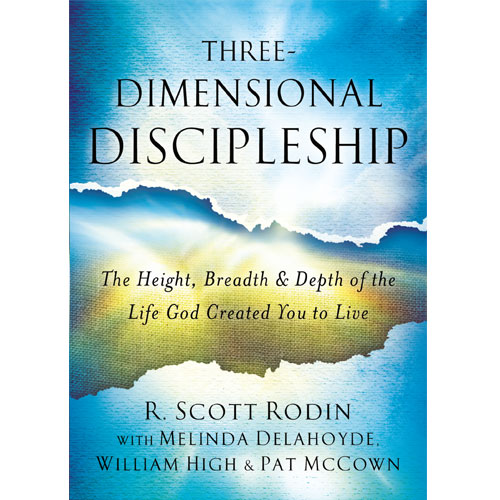Learning to Pray … Again

May 16, 2023
As stewards, God is always teaching us. Part of the joy of living openhandedly as a surrendered steward is watching how God continually guides us into new levels of intimacy with him. The greatest avenue to this intimacy is prayer, yet for many, or most … or all of us, experiencing the depth of prayer that brings authentic connection and ushers us into the real presence of God can be a challenge. Perhaps some of this frustration comes through in the plea from the disciples when they asked Jesus, “Lord, teach us to pray” (Luke 11:1). Imagine being in the presence of Jesus and still needing to be taught to pray.
Fortunately, Jesus responds with compassion and gives them the very words they can pray to connect with their heavenly Father. I invite you to join me on this five-week journey reflecting on Jesus’s instructions to His disciples on how they should pray – what we know as The Lord’s Prayer. I have experienced a wonderful blessing through this experience, and I want to share it with you. I have learned how our commitment to being faithful stewards is beautifully woven into this way of praying. While that shouldn’t surprise us, it has revolutionized my prayer life, and I hope there is a substantial blessing for you in this as well.
Over these next five weeks, I will look at The Lord’s Prayer in five sections. Each corresponds to a significant portion of our life as stewards. They are:
- The Steward’s Cry – our Father, hallowed be your name
- The Steward’s Commitment – your kingdom come, your will be done
- The Steward’s Confidence – our daily bread
- The Steward’s Confession – forgive us as we forgive
- The Steward’s Courage – deliver us
In this brief study, we will use the text from Matthew 6 from the New International Version as follows:
“This, then, is how you should pray:
Our Father in heaven, hallowed be your name,
your kingdom come, your will be done, on earth as it is in heaven.
Give us today our daily bread.
And forgive us our debts, as we also have forgiven our debtors.
And lead us not into temptation but deliver us from the evil one.”
My purpose is not to do an exegetical treatise on The Lord’s Prayer but simply to unite your spirit with how these words of Jesus open our hearts to pray as joyful stewards in a way that I believe not only pleases Him but unlocks the freedom and joy He has for us as His children. Please see Craig S. Keener, A Commentary on the Gospel of Matthew for those interested in an excellent scholarly treatment of this verse. Grand Rapids: Wm. B. Eerdmans, 1999. His full treatment is on pages 214 – 226.
Let’s begin.
Part One – The Steward’s Cry!
The first words of Jesus are game changers. He creates a formidable tension for his disciples and us if we fully understand what these words mean. They are words of intimacy followed by words of authority. While the use of the term ‘Father’ would not be new to his Jewish disciples (although it is found only 15 times in the Old Testament), the intimacy with which Jesus uses this word must have taken them back. As he did throughout his ministry (recorded from his lips some 65 times in the Synoptic Gospels), he was drawing them near into a depth of relationship with God they had never known. Yet, at the very same time, He proclaims God’s sovereignty, glory, and majesty; the God who is ‘in heaven’, and who deserves all glory, honor, and praise.
We must not miss this tension for us today. We can only be faithful stewards if we keep our every prayer, every day, and every thought of God squarely within this tension. As stewards, we acknowledge that everything belongs to God, and therefore he is to be hallowed and praised. The steward’s heart is set free to the extent that we lose ourselves in praise at the thought of God’s awesomeness and his glory.
So, let’s begin right where Jesus does. Let these truths from Scripture overwhelm your spirit and put in perspective all the challenges you might be facing today.
Who is like you, O LORD, among the gods? Who is like you, majestic in holiness, awesome in glorious deeds, doing wonders? (Exodus 15:11).
- Come and see what God has done: he is awesome in his deeds toward the children of man. (Psalm 66:5)
- “I am the Alpha and the Omega,” says the Lord God, “who is and who was and who is to come, the Almighty” (Revelation 1:8).
- O LORD God of heaven, the great and awesome God who keeps covenant and steadfast love with those who love him and keep his commandments (Nehemiah 1:5).
- God is greatly to be feared in the council of the holy ones and awesome above all who are around him (Psalm 89:7).
- Let them praise your great and awesome name! Holy is he! (Psalm 99:3).
- Behold, I am the LORD, the God of all flesh; is anything too difficult for Me? (Jeremiah 32:27).
- For the LORD your God is God of gods and Lord of lords, the great, the mighty, and the awesome God, who is not partial and takes no bribe (Deuteronomy 10:17).
- He is the one you praise; he is your God, who performed for you those great and awesome wonders you saw with your own eyes (Deuteronomy 10:21).
- He alone is your God, the only one who is worthy of your praise (Deuteronomy 10:21).
That is our God, dear friends. The God who is in heaven, worthy to be hallowed and praised, awesome, mighty, powerful, and fully in charge of all that he has created and continues to call his own. It is impossible to be a faithful steward without starting at this unequivocal declaration, “our God is in heaven, and he is worthy of our praise.”
Now comes the shocker. This almighty, omniscient, omnipotent creator and sustainer of all that is, is also … our Father. In the blood of Jesus, we have been drawn into the arms of a loving, gracious, and merciful heavenly Father. Paul, in Galatians, uses a startling term for this relationship, “Because you are his sons, God sent the Spirit of his Son into our hearts, the Spirit who calls out, ‘Abba, Father'” (Galatians 4:6).
Did you hear it? The Spirit of God, the Holy Spirit, sets us free as children of God in Jesus. The result is a heart that addresses this awesome God as our Father. The Greek word used here is κρᾶζον (krazon), which means to cry out. The word’s root is krazó, which literally means ‘to shriek.’
What an amazing picture of prayer from the heart of a faithful steward set free. God first reveals to us how our prayer life suffers because we have compromised his sovereignty and become complacent about his gift of intimacy. As a result, he can become very small and very distant.
This is the work of the enemy, and his agenda is to weaken and destroy our relationship with the Father. Perhaps Jesus started his prayer with these words because he knew the first place this battle is usually fought is within the tension of sovereignty and intimacy. Everything else in The Lord’s Prayer builds on this two-fold affirmation of the nature of God and our relationship to Him.
And so does our work as faithful stewards.
What God put on my heart was to begin each time of prayer by losing myself in His majesty through praise and adoration. And from there, to come directly before Him, this glorious God, and cry out – Father, my Father!
How are you stewarding this two-fold reality in your life? If either part is weak, commit today to ask the Holy Spirit to guide you back to that place of awesome adoration and personal relationship. As the writer of Hebrews put it, “draw with confidence before the throne of grace.” (Hebrews 4:10)
We can only be faithful stewards if we believe in the sovereign God who owns and controls ALL things. And we can only do the will of this Owner if we live in a loving and intimate relationship with Him.





